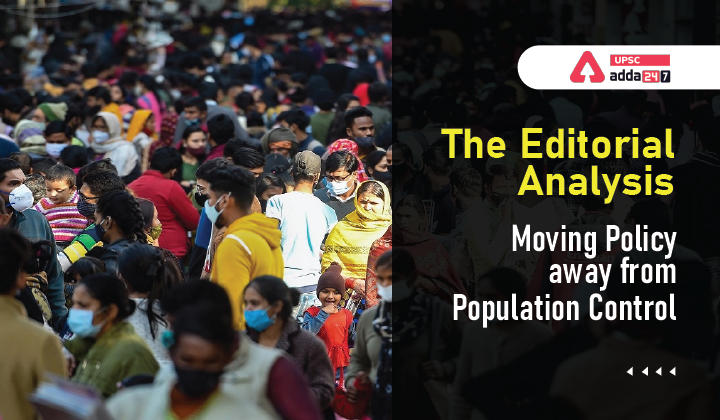Table of Contents
The Editorial Analysis- Moving Policy Away From Population Control- Relevance for UPSC Exam
General Studies I- Salient features of Indian Society, Diversity of India.
In News
The United Nations’ World Population Prospects (WPP), 2022, forecasts India becoming the most populous country by 2023, surpassing China, with a 140-crore population.
A Sea-Change
- In the 1960s, India had a population growth rate of over 2%. At the current rate of growth, this is expected to fall to 1% by 2025.
- Last year, India reached a significant demographic milestone as, for the first time, its total fertility rate (TFR) slipped to two, below the replacement level fertility (2.1 children per woman), as per the National Family Health Survey.
- Post-Independence, in the 1950s, India had a TFR of six.
- Bottlenecks in achieving a low TFR include high illiteracy levels, rampant child marriage, high levels of under-five mortality rates, a low workforce participation of women, and low contraceptive usage compared to other States.
- A majority of women in India do not have much of an economic or decisive say in their lives and without ameliorating the status of women in society (quality of life), only lopsided development is achievable.
Demographic Dividend
- A larger population is perceived to mean greater human capital, higher economic growth and improved standards of living.
- As in the World Population Prospects 2022, India will have one of the largest workforces globally, i.e., in the next 25 years, one in five working-age group persons will be living in India.
- This working-age bulge will keep growing till the mid-2050s, and India must make use of it.
Concerning Areas
1.Serious Health Risks
- The disease pattern in the country has also seen a tremendous shift in these 75 years: while India was fighting communicable diseases post-Independence, there has been a transition towards non-communicable diseases (NCDs), the cause of more than 62% of total deaths.
- India is a global disease burden leader as the share of NCDs has almost doubled since the 1990s, which is the primary reason for worry.
- India is home to over eight crore people with diabetes. Further, more than a quarter of global deaths due to air pollution occur in India alone.
- With an increasingly ageing population in the grip of rising NCDs, India faces a serious health risk in the decades ahead.
- In contrast, India’s health-care infrastructure is highly inadequate and inefficient.
- Additionally, India’s public health financing is low, varying between 1% and 1.5% of GDP, which is among the lowest percentages in the world.
- Even after reaching the replacement level of fertility, the population will continue to grow for three to four decades owing to the population momentum (large cohorts of women in their reproductive age groups).
- Demographic Dividend
- There are several obstacles to harnessing this demographic dividend.
- India’s labour force is constrained by the absence of women from the workforce; only a fourth of women are employed.
- The quality of educational attainments is not up to the mark, and the country’s workforce badly lacks the basic skills required for the modernized job market.
- Having the largest population with one of the world’s lowest employment rates is another enormous hurdle in reaping the ‘demographic dividend’.
- Another demographic concern of independent India is the male-dominant sex ratio.
- Every other woman in the reproductive age group in India is anemic, and every third child below five is stunted.
- India stands 101 out of 116 nations in the Global Hunger Index; this is pretty daunting for a country which has one of the most extensive welfare programmes for food security through the Public Distribution System and the Midday Meals Scheme.
Way Forward
- Improvement in sex ratio should be a priority as some communities face severe challenges from a marriage squeeze (an imbalance between the number of men and women available to marry in a specific society) and eventual bride purchase.
- India is called a young nation, with 50% of its population below 25 years of age
- Advance investments in the development of a robust social, financial and healthcare support system for old people is the need of the hour.
- The focus of action should be on extensive investment in human capital, on older adults living with dignity, and on healthy population ageing.
- We should be prepared with suitable infrastructure, conducive social welfare schemes and massive investment in quality education and health.
- The focus should not be on population control; we do not have such a severe problem now. Instead, an augmentation of the quality of life should be the priority.




 TSPSC Group 1 Question Paper 2024, Downl...
TSPSC Group 1 Question Paper 2024, Downl...
 TSPSC Group 1 Answer key 2024 Out, Downl...
TSPSC Group 1 Answer key 2024 Out, Downl...
 UPSC Prelims 2024 Question Paper, Downlo...
UPSC Prelims 2024 Question Paper, Downlo...
